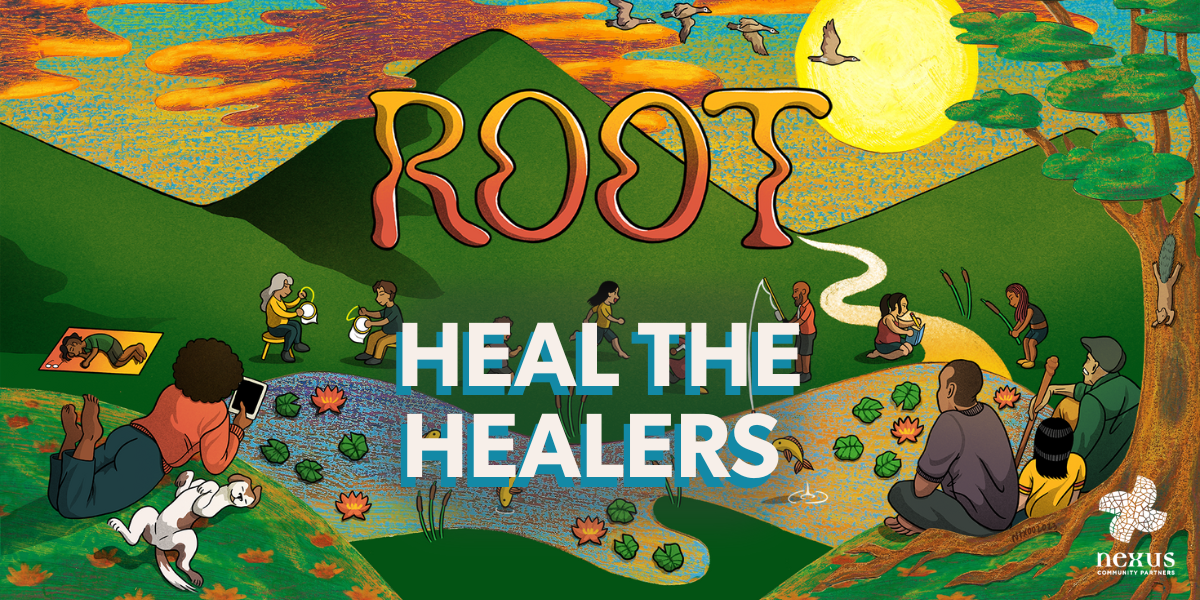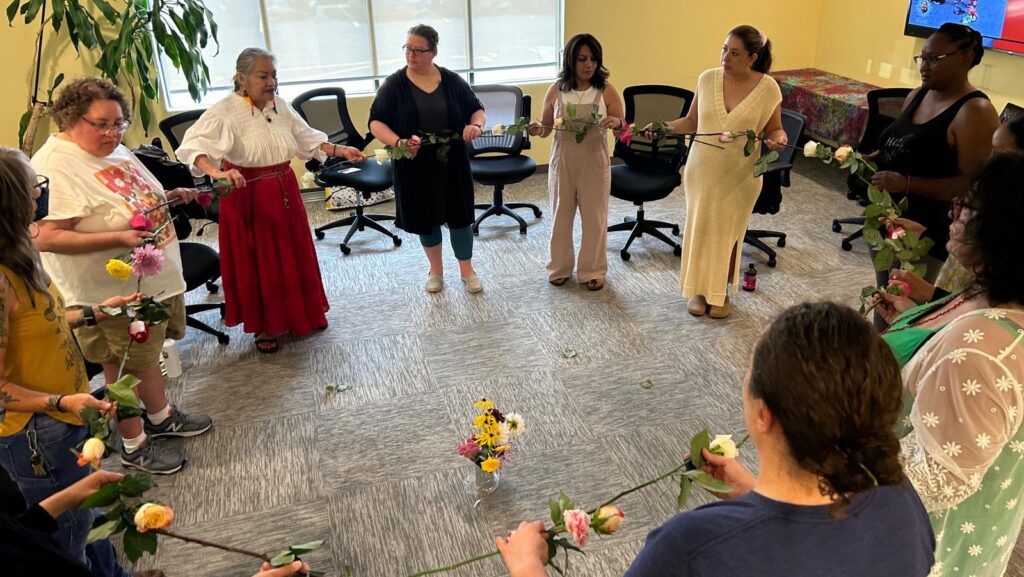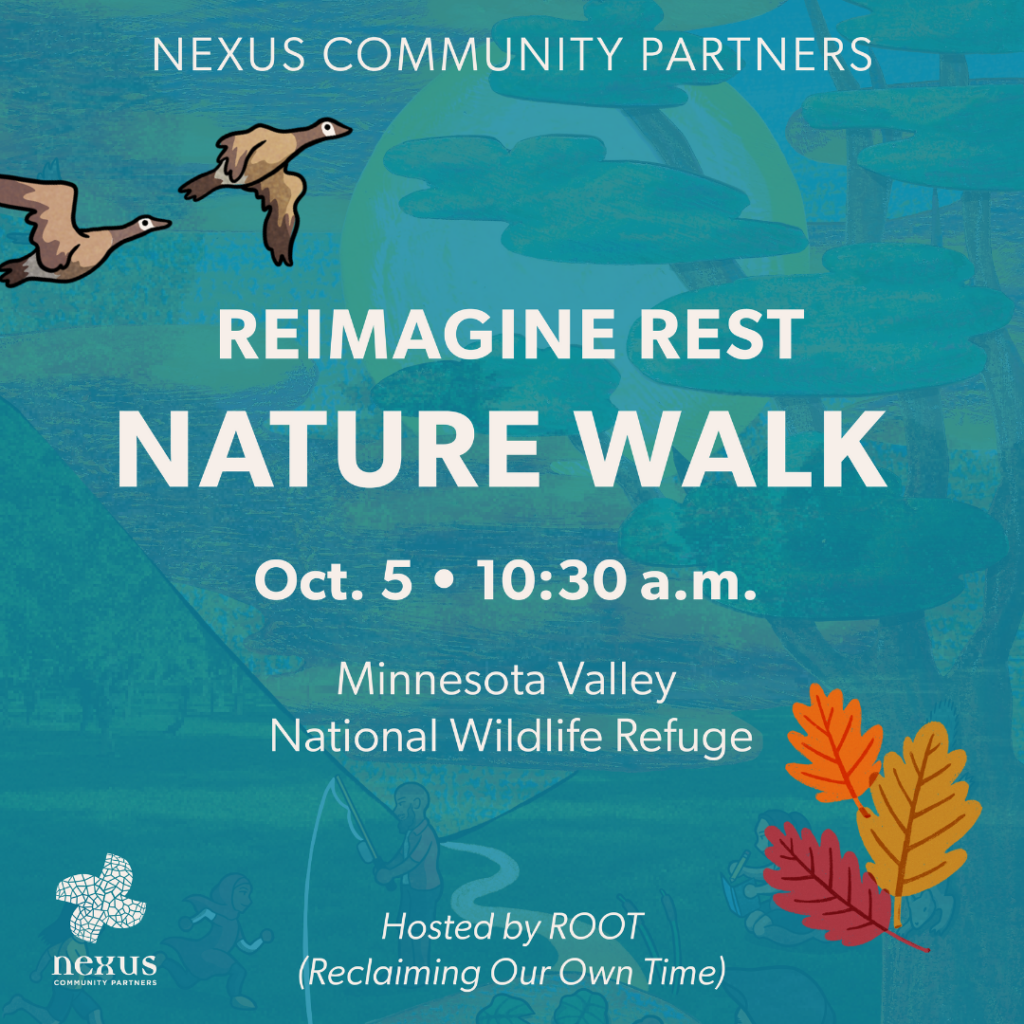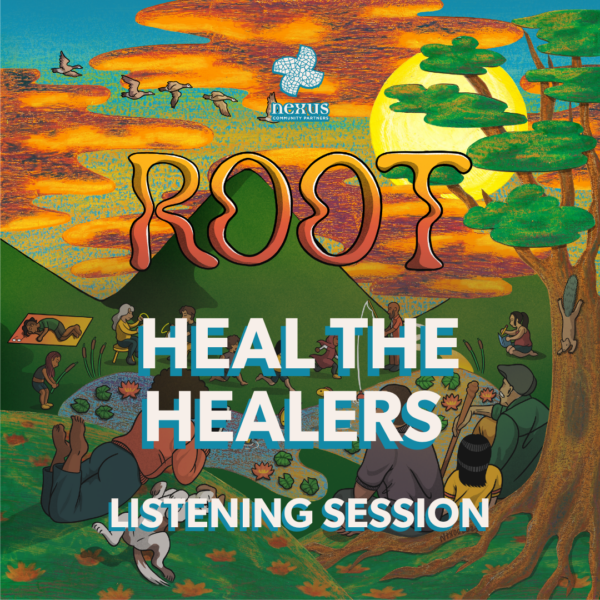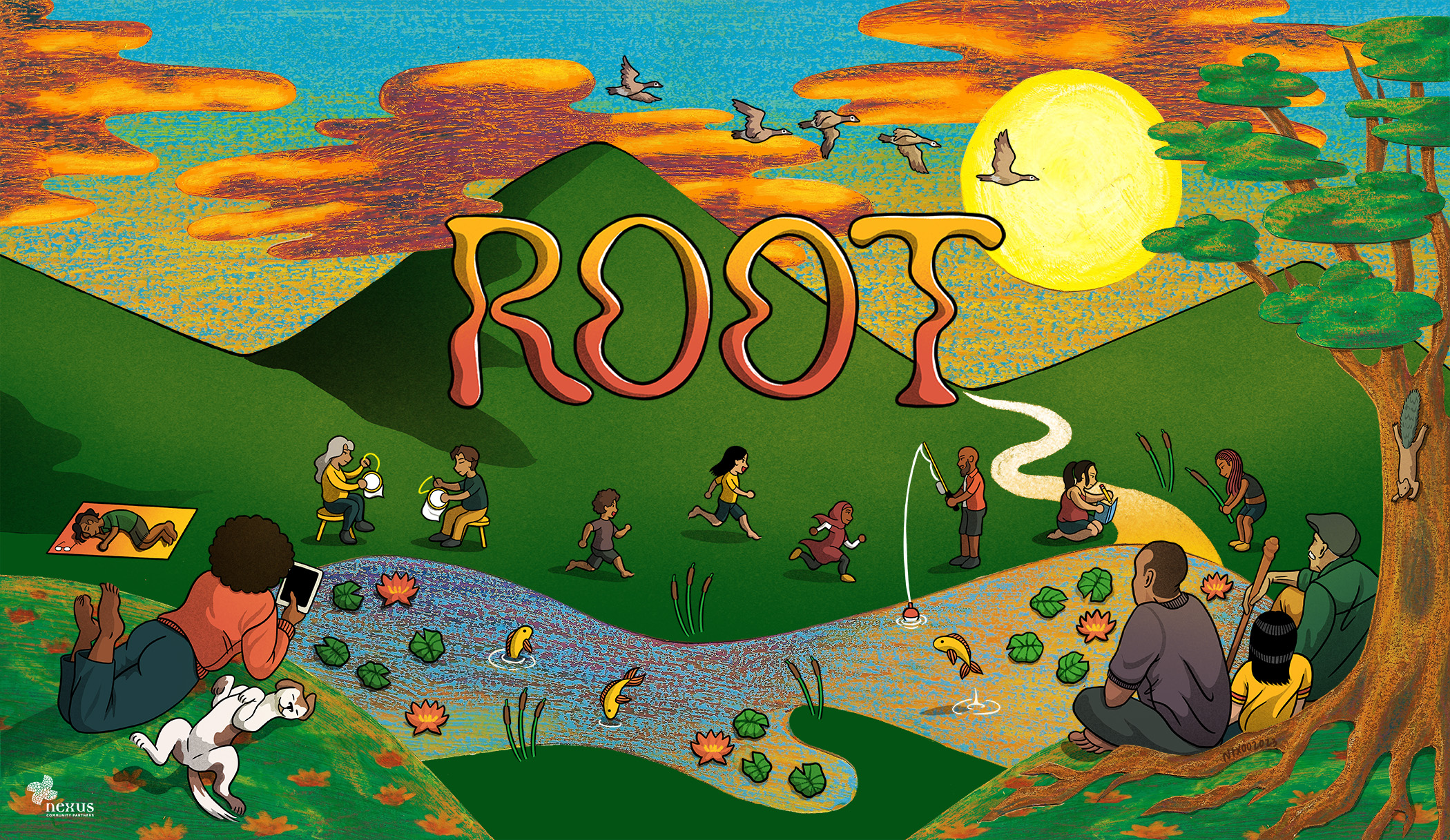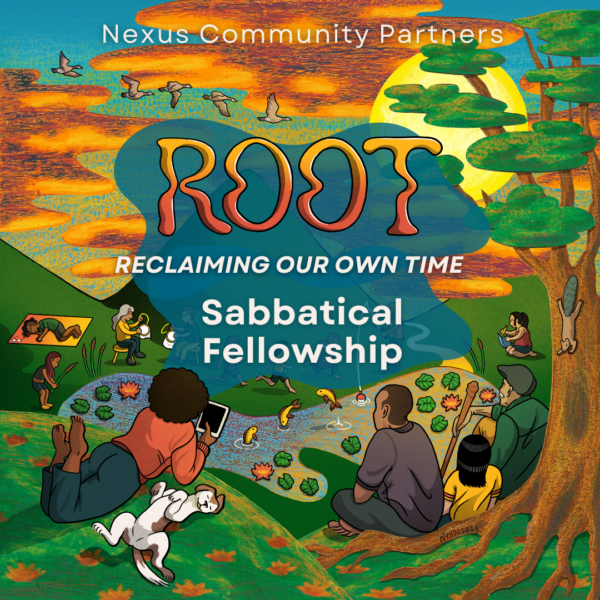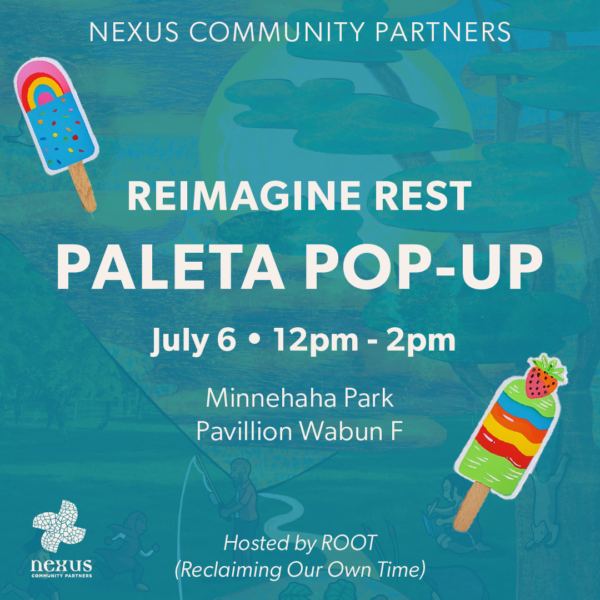At Nexus, we believe all people deserve joyful and abundant lives filled with the rest our bodies, minds, and spirits need. Rest is not for the privileged few — it is a birthright for all. Reclaiming Our Own Time (ROOT) is part of an ever-growing movement to provide resources, support, and spaces for rest and restoration for BIPOC leaders. Our ROOT staff members — Sook Jin Ong, Rosalva Mujwid Hernandez and Susy Morales — curate newsletter Care Packages, host Reimagine Rest events, and run our ROOT Sabbatical Fellowships. Get to know the team below!
What brought you to Nexus Community Partners?
Rosalva, Co-Director: When I choose a place to spend my time and be in shared work, it’s important to me that we have shared values. That comes through the organization’s mission and vision, yes, but also the people who work there. I had followed Nexus for a while on social media because there were some amazing people doing extraordinary things here; I very much admired them and the work they were doing. When I noticed the posting for the ROOT director go up one day, I thought, “This is something I’m not seeing anywhere else.” There was a big focus on centering rest, centering our very existence outside of having to be productive — really looking at the individuals’ divinity and their capacity to just be in the moment as being enough. I was really drawn to that.
Susy, Program Manager: I started with Nexus in 2020 as an AmeriCorps Public Ally. I was lucky enough to get matched with Nexus and then get hired on after my program here. I was drawn to Nexus’ values and how they talked about white supremacy culture really affecting communities. George Floyd had just been murdered; the pandemic was happening. We weren’t only talking about Black lives, we were also talking about our neighborhoods and what it felt like to be in the Twin Cities, a place where people were rising up and saying, “Enough,” — all the grief that’s tied to that as well as the hope. I really appreciated those conversations at Nexus and thought, “OK, this is a place I want to be in and grow.”
Sook Jin, Co-Director: I was already interacting with Nexus as a community member. So when the opportunity to be a part of ROOT came up, I was like, “Oh yeah, this is great.” One of the hardest lessons I’ve learned in my life is that need to reclaim what rest looks like and not let someone else dictate how my time, my energy, and my spirit are being spent. I wanted to work on that. And what better place than with the folks at Nexus?
When did you begin to view rest as a birthright, a pathway to liberation, an indisputable part of justice work? Tell us about your rest journey.
Rosalva: As children, I think we’re very much aware of the importance of rest. Viewing rest as a birthright is intuitive to us. As we grow, we pay less attention to those intuitions to become more productive, to survive, to thrive. I became less aware when I was going through school. And as I began to grow my family and accumulate things to support us, rest became more scarce because time was committed to these different buckets: a need to provide food, manage finances, make time for loved ones, be a caregiver to my elders, even care for myself…all those buckets were really full, and at the end of the day, I felt very unfulfilled. There were so many other things I wanted to do. All this time spent being productive and being of service was not leading me to the place I wanted to be — a whole person.
I think clarity comes at any point; I could have been 20 and had this clarity, but it wasn’t until I was 48 that it came to me. I was like, “Oh, I need to return to this pathway in order to find that joy and happiness and reconnect with that childhood, that sense of awe.” It’s always there. It gets obscured by basic life needs and then we navigate systems and uncover our truths. And that’s part of reclaiming our own time.
Sook Jin: I grew up in a family-business environment where the familial well-being is intertwined with economic well-being. Seeing how much my grandfather’s death (he was the anchor in the family business) changed the nature of how hard my family members had to work and the toll it took on them, especially on my dad, left a lasting impact on me. At a young age, this subconsciously shaped my sense of self-worth tied to work. I thought, “There are some responsibilities that you just gotta do because it’s family, it’s responsibility, it’s your loved ones. You gotta do it, no matter the toll it takes.”
As I’m coming into an age where I am grappling with major changes in my health, my dad’s advice to “take care of yourself; don’t burn out,” hits differently now. He burned out, and I saw the consequences to his well-being. It’s easy to look back and say, “I wish I had started resting earlier.” It’s not too late to start. I don’t think our ancestors, our elders, want us to suffer. I think they would have wanted life to be different for us. If we can begin to rest, let’s do it.
Susy: I feel very fortunate to have grown up around my parents, who were the first people to teach me how to dream. They struggled their entire lives and dared to dream despite the poverty they lived in, the violence of war they survived and had to witness in Guatemala. Despite all those things, they said, “I’m not going to accept this.” I think for them, it was dreaming while being very scared to reach for more. But at the end of the day, saying, “I will reach for it.”
What does reclaiming the narrative on rest mean to you?
Susy: Through my parents’ stories I was able to know, “Oh, this is where we come from.” We come from a line of fighters and survivors and really hurt people, really angry people. All those things are tied together, so that became my story. When people asked me, “Who are you?” I held onto that story and the pridefulness I felt from thinking of my family. But within the last few years, I started wondering, what would it look like if our story wasn’t constantly a story of resistance? What would it be like if future generations could look at our family and instead of saying, “we are a family of survivors,” it was, “we are a family of dreamers,” or “our family is joyful”?
This ties back to what I’m reading right now: All the Black Girls Are Activists by EbonyJanice Moore. She says a lot of activists, specifically Black women and girls, center their activist identity out of survival. They have to fight for themselves, for their loved ones, for their community. But what would it look like if they were allowed to be their whole selves and not only center that part of their identity, but also center this whole other part of them that feels joy through hobbies or through community?
What would it look like if our active resistance was through rest and joy?
Rosalva: To reclaim something is powerful on its own, because it means the narrative around it has shifted. I came to Minnesota as a migrant farm laborer, and my history is a story of people working on the land. I sometimes have strong feelings about the limitations of terms like “migrant farm laborer,” because it narrows down who we are as people to one task — labor. You could also call a migrant farm laborer a project manager, because you need so many skills to survive in really harsh conditions as a family. You are navigating systems, negotiating with contractors or farm owners, ensuring your family is functioning at its best, and trying to meet a tight timeline. I want to reclaim this term because it’s bothered me, the way it’s been narrowly interpreted. There’s so much power in reclaiming something. It’s making yourself whole again.
I’m in the middle of taking 30 days off work, and that is my intentional effort to reclaim my time. I’m still going to do housework: I need to scrub the tiles in my bathroom; there’s my front yard covered in weeds. But my first week, all I did was reach out to people. I want to reclaim my time as being with the people I love. I’m going to travel with loved ones, and I’m going to start some new books, but I’m also going to be intentionally slower at everything because I own my time. In addition to making my story whole, it is an opportunity to refocus my view on myself and my world.
Sook Jin: It’s that act of trying out what rest means to you and not letting someone else define it for you. You have the pen; you can decide what this looks like. I think that’s reclaiming in so many ways. Usually when work becomes incredibly busy, people tend to try and be there. But let’s try honoring each other’s rest when it’s needed, instead of centering work. There’s gonna be so much we can learn from Rosalva honoring her rest right now, and learning to walk the talk on communal care.
Our team is intentional about how we try to be responsive to community members and also make sure we don’t burn ourselves out. Sometimes I think we make up this story in our heads: “Oh my gosh, I have to respond to the email immediately” or “I have to say yes to every single thing.” We forget to engage each other. When we name what we’re trying to do with each other, it’s amazing how folks are like, “Oh, don’t worry. Talk to me next week. We’re good.” That act of reclaiming can be done together and can be done with so much relational care.
